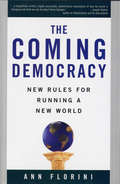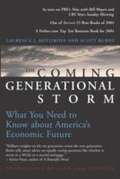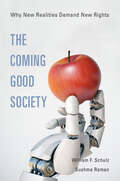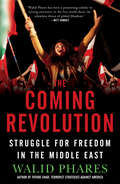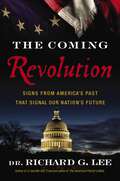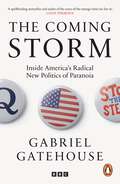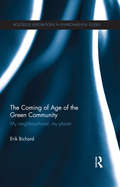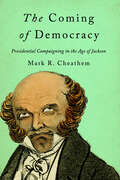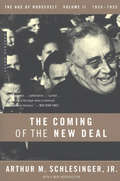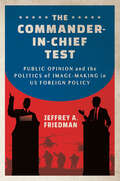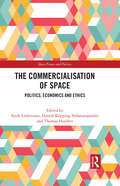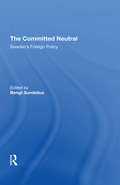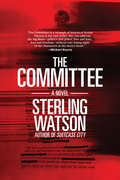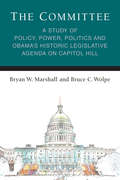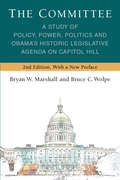- Table View
- List View
The Coming Democracy: New Rules For Running A New World
by Ann FloriniNational governments are proving ill-equipped to manage an increasingly complicated suite of global problems, from infectious diseases to climate change to conflicts over international trade. In The Coming Democracy, leading political analyst Ann Florini sets forth a compelling new paradigm for transnational governance, one based on the concept of "transparency"-- the idea that the free flow of information (on topics ranging from corporate and government behavior to nuclear proliferation to biodiversity protection) provides powerful ways to hold decision makers accountable and to give ordinary people meaningful voice in shaping the policies that affect them. Dramatic breakthroughs in information technology of the past decade have made such transparency possible on a global scale.Florini offers a clear and comprehensive assessment of the possibilities for using transparency to develop effective approaches to transnational governance. She shows how this new form of governance promises real hope for managing global problems, and provides a compelling scenario that demonstrates how existing conventions and institutions can lead the way in the evolution of a better system of global governance.
The Coming Economic Implosion of Saudi Arabia: A Behavioural Perspective
by David CowanThe kingdom of Saudi Arabia is at a crossroads economically, and faces the challenge of a weakening economy that could implode before 2030, the year set as a timetable by the kingdom in its Vision 2030. How it navigates its way out of these economic troubles demands understanding a complex of religious, political and economic factors, which currently makes it one of the most unpredictable states in the world and, by the same token, one of the most fascinating. The problem of the Saudi economy cannot simply be argued economically, it needs political and religious solutions as well. Cowan takes a behavioural approach to analysing the Saudi economy. Predicting an implosion under the weight of its own ideologically-fuelled economy if it does not reset its agenda, this interdisciplinary book provides important insights into Saudi Arabia's position in the Islamic world and global economy.
The Coming Generational Storm: What You Need to Know About America's Economic Future
by Laurence J. Kotlikoff Scott BurnsThe Coming Generational Storm has been revised and updated and includes a new foreword by the authors. In 2030, as 77 million baby boomers hobble into old age, walkers will outnumber strollers.
The Coming Good Society: Why New Realities Demand New Rights
by William F. Schulz Sushma Ramen&“Challenge[s] all of us to think deeply about what kind of society we and our children and our children&’s children will want to live in.&” (Margaret L. Huang, former Executive Director, Amnesty International USA) A rights revolution is under way. Today the range of nonhuman entities thought to deserve rights is exploding. Changes in norms and circumstances require the expansion of rights: What new rights, for example, are needed if we understand gender to be nonbinary? Does living in a corrupt state violate our rights? When biotechnology is used to change genetic code, whose rights might be violated? What rights, if any, protect our privacy from the intrusions of sophisticated surveillance techniques? Drawing on their vast experience as human rights advocates, William Schulz and Sushma Raman challenge us to think hard about how rights evolve with changing circumstances, and what rights will look like ten, twenty, or fifty years from now. The Coming Good Society details the many frontiers of rights today and the debates surrounding them. Schulz and Raman equip us with the tools to engage the present and future of rights so that we understand their importance and know where we stand. &“Thoughtful and provocative.&” —Human Rights Quarterly &“[A] trail-blazing map through the new frontiers of rights . . . downright riveting.&” —Gloucester Times &“An accessible primer for anyone who wishes to understand the current limitations in our notions of rights and the future challenges for which we must prepare.&” —Kerry Kennedy, President, Robert F. Kennedy Human Rights &“Schulz and Raman outline brilliantly where [human rights] growth may take rights in the generations to come.&” ―Zeid Ra&’ad al-Hussein, former United Nations High Commissioner for Human Rights
The Coming Revolution
by PharesAfter the 9/11 Commission concluded in 2004 that the U.S. was engaged in a war with terrorists and never realized it, they reasoned that "a failure of imagination" had prevented us from seeing terrorism coming. In effect, Americans were simply unable, or in fact disabled, to fathom that there were people who hated and opposed our democracy with such ferocity. But after billions of dollars and almost a decade fighting a war in the Middle East, will we miss the threat again? With penetrating insight and candor, Walid Phares, Fox News terrorism and Middle East expert and a specialist in global strategies, argues that a fierce race for control of the Middle East is on, and the world's future may depend on the outcome. Yet not a failure of imagination, but rather, of education has left Americans without essential information on the real roots of the rising Jihadi threat. Western democracies display a dangerous misunderstanding of precisely who opposes democracy and why. In fact, the West ignores the wide and disparate forces within the Muslim world--including a brotherhood against democracy that is fighting to bring the region under totalitarian control--and crucially underestimates the determined generation of youth feverishly waging a grassroots revolution toward democracy and human rights. As terror strikes widen from Manhattan to Mumbai and battlefields rage from Afghanistan to Iraq, many tough questions are left unanswered, or even explored: Where are the anti-Jihadists and the democrats in the Muslim world? Does the Middle East really reject democracy? Do the peoples of the region prefer the Taliban, the Muslim Brotherhood, or Hezbollah over liberals and seculars? And is there really no genuine hope that freedom and democracy can prevail over the Islamist caliphate? Phares explores how the free world can indeed win the conflict with the Jihadists, but he says, not by using the tactics, policies, and strategies it has employed so far. He urges policy makers to first identify the threat and define its ideology, or there will be no victory. The Coming Revolution is a vital corrective step in the world's war against terrorism and essential reading that clearly and explosively illustrates the untold story of a struggle to determine if the Middle East can at last reach freedom in this century--or if this planet can prevent the otherwise inevitable outcome that could change our social and political landscape forever. The race is on.
The Coming Revolution: Signs from America's Past That Signal Our Nation's Future
by Richard LeePeople need a creed and a cause, and today millions of patriotic Americans are finding their voices.They say the best indicator of the future is history. How things have been can be a powerful signal of how they will be. But what will be our role in shaping the future for this country?In The Coming Revolution Dr Richard G. Lee powerfully explains that a new revolution is coming. It may be in the streets of our nation's capitol--as we saw in Europe last year--or, better yet, in voting booths across America. Signs from our nation's past and present ring out the truth: a second American revolution is near at hand.Using this country's rich heritage of liberty and democracy as a roadmap toward where we could be headed, Dr. Lee brings thoughtful clarity to the ever-growing probability of such a revolution in America; illuminating the important reminder that the voices of every revolution have been--and always will be--the ordinary everyman.Discover how you can be a part of this country's social, political, and moral reform and how faith in God serves as the one truth that can provide both individual and national guidance for America's next revolution."A powerful reminder about why America is great and worth fighting for."--Lt. Colonel Oliver L. North, USMC (Ret.)"Within this book Dr. Richard Lee clearly reveals how the intolerable conditions being forced upon the American people by Washington's current administration will lead to a certain and powerful explosion of predictable consequences."--Michael Reagan
The Coming Storm: A Journey into the Heart of the Conspiracy Machine
by Gabriel GatehouseIs this how democracy dies?Based on his smash hit podcast, The Coming Storm is Gabriel Gatehouse's brilliant exploration of the roots of Q Anon and the rise of the extreme right in the US. It's a story that reaches back decades, showing how a dark fantasy embedded itself in the American consciousness, threatening to derail its democracy - and it continues to unfold today. Gatehouse's riveting book takes you down a rabbit hole - one that both the US as a nation and he as a journalist fell through - to unpack an epochal shift in political culture that starts in the earliest years of the Clinton administration and reaches a crescendo on 6 January 2021 with the storming of the US Capitol. But that event wasn't the wild finale of a chaotic Trump presidency many hoped for - it was only the beginning.A compelling mix of reportage and personal experience, The Coming Storm gets under the skin of these conspiracy theories to show us a radical new kind of politics emerging, a movement that has coalesced around a loose alliance of white supremacists, men's rights activists, tech bros, and radically disenchanted leftists. As we approach the 2024 US presidential election, and perhaps the most perilous moment in the history of American democracy, Gatehouse's book tells us some dark truths about our present, and provides clues about our future. It marks the debut of a major new voice in political journalism.
The Coming of Age of the Green Community: My neighbourhood, my planet (Routledge Explorations in Environmental Studies)
by Erik BichardPeople organising to protect their environment is not a new phenomenon, but the groups that have been pushing for environmental change since the 1970s have not convinced sufficient numbers make sustainable decisions or to lead sustainable lives. Governments have serially failed to do the job at the international level. Now, climate change, resource depletion and widening social aspirations threaten to destabilise human society unless sustainable change can be influenced from another direction. The Coming of Age of the Green Community explores the activities of a new generation of community-led initiatives that may herald the beginnings of the next wave of activism. Erik Bichard combines the testimonies of dozens of group activists with historic evidence and the views of a range of commentators from a variety of disciplines to put forward reasons why some green community groups succeed while others fail. He concludes with a valuable prescription for both existing and emerging groups on how to be sustainable, both over time and in their actions. This book address one of the key questions of the twenty-first century: has the local perspective on this universal concern finally come of age?
The Coming of Democracy: Presidential Campaigning in the Age of Jackson
by Mark R. CheathemA look at the evolution of presidential campaigning from 1824 to 1840. If you think politics are uncivil now...Winner of the Phi Alpha Theta History Honor Society Best Subsequent Book Award by the Phi Alpha Theta History Honor SocietyAfter the "corrupt bargain" that awarded John Quincy Adams the presidency in 1825, American politics underwent a fundamental shift from deference to participation. This changing tide eventually propelled Andrew Jackson into the White House—twice. But the presidential race that best demonstrated the extent of the changes was that of Martin Van Buren and war hero William Henry Harrison in 1840. Harrison’s campaign was famously marked by sloganeering and spirited rallies. In The Coming of Democracy, Mark R. Cheathem examines the evolution of presidential campaigning from 1824 to 1840. Addressing the roots of early republic cultural politics—from campaign biographies to songs, political cartoons, and public correspondence between candidates and voters—Cheathem asks the reader to consider why such informal political expressions increased so dramatically during the Jacksonian period. What sounded and looked like mere entertainment, he argues, held important political meaning. The extraordinary voter participation rate—over 80 percent—in the 1840 presidential election indicated that both substantive issues and cultural politics drew Americans into the presidential selection process.Drawing on period newspapers, diaries, memoirs, and public and private correspondence, The Coming of Democracy is the first book-length treatment to reveal how presidents and presidential candidates used both old and new forms of cultural politics to woo voters and win elections in the Jacksonian era. This book will appeal to anyone interested in US politics, the Jacksonian/antebellum era, or the presidency.
The Coming of Democracy: Presidential Campaigning in the Age of Jackson
by Mark R. CheathemA look at how presidential campaigning changed between 1824 to 1840, leading to a new surge in voter participation: “A pleasure to read.” —Robert M. Owens, author of Mr. Jefferson’s HammerAfter the “corrupt bargain” that awarded John Quincy Adams the presidency in 1825, American politics underwent a fundamental shift from deference to participation. This changing tide eventually propelled Andrew Jackson into the White House—twice. But the presidential race that best demonstrated the extent of the changes was that of Martin Van Buren and war hero William Henry Harrison in 1840. Harrison’s campaign was famously marked by sloganeering and spirited rallies.In The Coming of Democracy, Mark R. Cheathem examines the evolution of presidential campaigning from 1824 to 1840. Addressing the roots of early republic cultural politics—from campaign biographies to songs, political cartoons, and public correspondence between candidates and voters—Cheathem asks the reader to consider why such informal political expressions increased so dramatically during the Jacksonian period. What sounded and looked like mere entertainment, he argues, held important political meaning. The extraordinary voter participation rate—over 80 percent—in the 1840 presidential election indicated that both substantive issues and cultural politics drew Americans into the presidential selection process.Drawing on period newspapers, diaries, memoirs, and public and private correspondence, The Coming of Democracy is the first book-length treatment to reveal how presidents and presidential candidates used both old and new forms of cultural politics to woo voters and win elections in the Jacksonian era. This book, winner of an award from the Phi Alpha Theta History Honor Society, is excellent and thought-provoking reading for anyone interested in US politics, the Jacksonian/antebellum era, or the presidency.
The Coming of the Celts, AD 1860: Celtic Nationalism in Ireland and Wales
by Caoimhín De Barra&“Finely researched and lucidly written . . . details the rise, ebb, and flow of the idea of a common Celtic identity linking Ireland and Wales.&” —The New York Review of Books Who are the Celts, and what does it mean to be Celtic? In this book, Caoimhín De Barra focuses on nationalists in Ireland and Wales between 1860 and 1925, a time period when people in these countries came to identify themselves as Celts. De Barra chooses to examine Ireland and Wales because, of the six so-called Celtic nations, these two were the furthest apart in terms of their linguistic, religious, and socioeconomic differences. The Coming of the Celts, AD 1860 is divided into three parts. The first concentrates on the emergence of a sense of Celtic identity and the ways in which political and cultural nationalists in both countries borrowed ideas from one another in promoting this sense of identity. The second part follows the efforts to create a more formal relationship between the Celtic countries through the Pan-Celtic movement; the subsequent successes and failures of this movement in Ireland and Wales are compared and contrasted. Finally, the book discusses the public juxtaposition of Welsh and Irish nationalisms during the Irish Revolution. De Barra&’s is the first book to critique what &“Celtic&” has meant historically, and it sheds light on the modern political and cultural connections between Ireland and Wales, as well as modern Irish and Welsh history. It will also be of interest to professional historians working in the field of &“Four Nations&” history, which places an emphasis on understanding the relationships and connections between the four nations of Britain and Ireland.
The Coming of the New Deal, 1933-1935 (The Age of Roosevelt, Vol. II)
by Arthur M. SchlesingerThe second volume of Arthur M. Schlesinger, Jr.'s Age of Roosevelt series details the accomplishments of the first 100 days of Franklin D. Roosevelt's presidency. Coming into office at the bottom of the Great Depression, FDR restored national morale and, with his New Deal colleagues, brought innovative if often controversial approaches to recovery and reform.
The Coming of the New Deal: The Age of Roosevelt, 1933–1935 (The Age of Roosevelt #2)
by Arthur M. Schlesinger Jr.Volume two of the Pulitzer Prize-winning author&’s Age of Roosevelt series describes Franklin Delano Roosevelt&’s first tumultuous years in the White House.Coming into office at the bottom of the Great Depression, FDR told the American people that they have nothing to fear but fear itself. The conventional wisdom having failed, he tried unorthodox remedies to avert economic collapse. His first hundred days restored national morale, and his New Dealers filled Washington with new approaches to recovery and reform. Combining idealistic ends with realistic means, Roosevelt proposed to humanize, redeem, and rescue capitalism. The Coming of the New Deal, written with Schlesinger&’s customary verve, is a gripping account of critical years in the history of the republic.&“Monumental…authoritative…spirited…one of the major works in American historical literature.&”—New York Times &“Impelling, an achievement as much in its sensitivity as in its scholarship…It is essential reading.&”—Kirkus Reviews
The Coming of the Wolf: The Wild Hunt series prequel
by Elizabeth ChadwickShortlisted for the RNA Historical Romantic Novel AwardThe long-awaited prequel to Elizabeth Chadwick's bestselling and beloved first novel The Wild Hunt'Picking up an Elizabeth Chadwick novel you know you are in for a sumptuous ride'Daily TelegraphThe Welsh Borders, 1069 When Ashdyke Manor is attacked, Lady Christen is forced to witness her husband's murder and the pillaging of her lands at the hands of brutal Norman invaders. It seems the pain is finally over when Miles Le Gallois, Lord of Milnham-on-Wye, calls off the attack. But he has Christen's brother under armed guard and a deal to offer: her brother's freedom for her hand in marriage. Christen finds herself hastily married into the enemy side, with her brother swearing his vengeance on her new husband. Miles and Christen's precarious union invites enemies from all sides and when Miles is summoned for a lengthy campaign by the King, Christen is left to watch his lands. In the midst of war, two enemies must somehow learn to trust one another if they are to survive . . .Praise for Elizabeth Chadwick 'An author who makes history come gloriously alive'The Times 'Stunning . . . Her characters are beguiling, and the story is intriguing'Barbara Erskine 'Meticulous research and strong storytelling'Woman & Home
The Coming of the Wolf: The Wild Hunt series prequel (Wild Hunt #4)
by Elizabeth ChadwickThe long-awaited prequel to Elizabeth Chadwick's bestselling and beloved first novel The Wild Hunt'Picking up an Elizabeth Chadwick novel you know you are in for a sumptuous ride'Daily Telegraph The Welsh Borders, 1069 When Ashdyke Manor is attacked, Lady Christen is forced to witness her husband's murder and the pillaging of her lands at the hands of brutal Norman invaders. It seems the pain is finally over when Miles Le Gallois, Lord of Milnham-on-Wye, calls off the attack. But he has Christen's brother under armed guard and a deal to offer: her brother's freedom for her hand in marriage. Christen finds herself hastily married into the enemy side, with her brother swearing his vengeance on her new husband. Miles and Christen's precarious union invites enemies from all sides and when Miles is summoned for a lengthy campaign by the King, Christen is left to watch his lands. In the midst of war, two enemies must somehow learn to trust one another if they are to survive . . .Praise for Elizabeth Chadwick 'An author who makes history come gloriously alive'The Times 'Stunning . . . Her characters are beguiling, and the story is intriguing'Barbara Erskine 'I rank Elizabeth Chadwick with such historical novelist stars as Dorothy Dunnett and Anya Seton'Sharon Kay Penman 'Enjoyable and sensuous'Daily Mail'Meticulous research and strong storytelling'Woman & Home 'A riveting read . . . A glorious adventure not to be missed!'Candis
The Coming of the Wolf: The Wild Hunt series prequel (Wild Hunt #4)
by Elizabeth ChadwickShortlisted for the RNA Historical Romantic Novel AwardThe long-awaited prequel to Elizabeth Chadwick's bestselling and beloved first novel The Wild Hunt'Picking up an Elizabeth Chadwick novel you know you are in for a sumptuous ride'Daily Telegraph The Welsh Borders, 1069 When Ashdyke Manor is attacked, Lady Christen is forced to witness her husband's murder and the pillaging of her lands at the hands of brutal Norman invaders. It seems the pain is finally over when Miles Le Gallois, Lord of Milnham-on-Wye, calls off the attack. But he has Christen's brother under armed guard and a deal to offer: her brother's freedom for her hand in marriage. Christen finds herself hastily married into the enemy side, with her brother swearing his vengeance on her new husband. Miles and Christen's precarious union invites enemies from all sides and when Miles is summoned for a lengthy campaign by the King, Christen is left to watch his lands. In the midst of war, two enemies must somehow learn to trust one another if they are to survive . . .Praise for Elizabeth Chadwick 'An author who makes history come gloriously alive'The Times 'Stunning . . . Her characters are beguiling, and the story is intriguing'Barbara Erskine 'I rank Elizabeth Chadwick with such historical novelist stars as Dorothy Dunnett and Anya Seton'Sharon Kay Penman 'Enjoyable and sensuous'Daily Mail'Meticulous research and strong storytelling'Woman & Home 'A riveting read . . . A glorious adventure not to be missed!'Candis
The Commander's Dilemma: Violence and Restraint in Wartime
by Amelia Hoover GreenWhy do some military and rebel groups commit many types of violence, creating an impression of senseless chaos, whereas others carefully control violence against civilians? A classic catch-22 faces the leaders of armed groups and provides the title for Amelia Hoover Green’s book. Leaders need large groups of people willing to kill and maim—but to do so only under strict control. How can commanders control violence when fighters who are not under direct supervision experience extraordinary stress, fear, and anger? The Commander’s Dilemma argues that discipline is not enough in wartime. Restraint occurs when fighters know why they are fighting and believe in the cause—that is, when commanders invest in political education.Drawing on extraordinary evidence about state and nonstate groups in El Salvador, and extending her argument to the Mano River wars in Liberia and Sierra Leone, Amelia Hoover Green shows that investments in political education can improve human rights outcomes even where rational incentives for restraint are weak—and that groups whose fighters lack a sense of purpose may engage in massive violence even where incentives for restraint are strong. Hoover Green concludes that high levels of violence against civilians should be considered a "default setting," not an aberration.
The Commander-in-Chief Test: Public Opinion and the Politics of Image-Making in US Foreign Policy (Cornell Studies in Security Affairs)
by Jeffrey A. FriedmanIn The Commander-in-Chief Test, Jeffrey A. Friedman offers a fresh explanation for why Americans are often frustrated by the cost and scope of US foreign policy—and how we can fix that for the future.Americans frequently criticize US foreign policy for being overly costly and excessively militaristic. With its rising defense budgets and open-ended "forever wars," US foreign policy often appears disconnected from public opinion, reflecting the views of elites and special interests rather than the attitudes of ordinary citizens.The Commander-in-Chief Test argues that this conventional wisdom underestimates the role public opinion plays in shaping foreign policy. Voters may prefer to elect leaders who share their policy views, but they prioritize selecting presidents who seem to have the right personal attributes to be an effective commander in chief. Leaders then use hawkish foreign policies as tools for showing that they are tough enough to defend America's interests on the international stage. This link between leaders' policy positions and their personal images steers US foreign policy in directions that are more hawkish than what voters actually want.Combining polling data with survey experiments and original archival research on cases from the Vietnam War through the occupations of Iraq and Afghanistan, Friedman demonstrates that public opinion plays a surprisingly extensive—and often problematic—role in shaping US international behavior. With the commander-in-chief test, a perennial point of debate in national elections, Friedman's insights offer important lessons on how the politics of image-making impacts foreign policy and how the public should choose its president.
The Commercialisation of Space: Politics, Economics and Ethics (Space Power and Politics)
by Thomas Hoerber Sarah Lieberman Harald Köpping AthanasopoulosThis interdisciplinary book examines the impact of the commercialisation of space and the changing outlook of the space sector. Using a framework based around theories of international political economy (IPE), the chapters take on issues relating to the politics, the economics and the ethics of commercialising space. The book aims to build a bridge between the research carried out on European Space Policy and the issues that are currently pertinent in the global discussion of future space policy. Overall, the volume aims to: • inform the reader about historical and contemporary developments in the neoliberal commercialisation of space; • assess the impact of the commercialisation of space on European space institutions, European space policy and European space culture; • raise ethical questions about the environmental and practical sustainability of the commercialisation of space; • examine the compatibility of the commercialisation of space with international, EU and national law. This book will be of much interest to students of space policy, global governance, European politics and International Relations.
The Commission: The Uncensored History of the 9/11 Investigation
by Philip ShenonIn a work of history that will make headlines, New York Times reporter Philip Shenon investigates the investigation of 9/11 and tells the inside story of most important federal commission since the the Warren Commission. Shenon uncovers startling new information about the inner workings of the 9/11 commission and its relationship with the Bush White House. The Commission will change our understanding of the 9/11 investigation -- and of the attacks themselves.
The Committed Neutral: Sweden's Foreign Policy
by Bengt A SundeliusThis book is a collection of essays by Swedish and American academics begins by putting into its historical perspective the classic definition of Swedish foreign policy as freedom from alliance in peace, aiming for neutrality in war and it helps to gain new insights on the Sweden's foreign policy.
The Committee: A Novel
by Sterling Watson“Transmutes Lavender Scare investigators’ ruthless assaults on suspected homosexuals in 1950s Gainesville into heart-racing fiction.” —New York Journal of BooksIn the late 1950s, Gainesville, Florida, seems to be a sleepy university town. Its residents live, by outward appearances, ordinary lives. And yet the town is far from ordinary. The most private acts of professors, students, townspeople rich and poor, and politicians are under the close scrutiny of a shadowy group of men—the Committee—who use the powers of government and the police to investigate, threaten, and control this increasingly fearful community.The Committee pits friends against friends and threatens careers and lives in a struggle for the soul of a town, a university, and an ideal. Based on actual historical events and set against the backdrop of political, cultural, and class turmoil, this is a story of love—both licit and hidden—war, friendship, betrayal, compromise, and finally the necessity to stand firm against the encroachments upon freedom by men who believe they are doing God’s and the government’s righteous work.“The Committee takes place on campus, but deserves to be included with those ‘academic’ novels like Mary McCarthy’s The Groves of Academe, Randall Jarrell’s Pictures from an Institution, Kingsley Amis’s Lucky Jim, and Jane Smiley’s Moo, all books that burst out of their scholarly settings to light up the characters and societies they live in . . . This book will hold you to the very end, and after.” —Peter Meinke, Creative Loafing Tampa Bay“At once an historical, political, and academic novel, and it is one that succeeds on all these fronts.” —Reviewing the Evidence
The Committee: A Study of Policy, Power, Politics and Obama's Historic Legislative Agenda on Capitol Hill (Legislative Politics And Policy Making)
by Bryan W. Marshall Bruce C WolpeFor three years while serving as a senior adviser to Rep. Henry A. Waxman (D-CA), chairman of the House Committee on Energy and Commerce—one of the most powerful committees in Congress—Bruce C. Wolpe kept a diary, a senior staffer’s look at how committees develop and promote legislation. With its insider’s view of the rough-and-tumble politics of cap-and-trade, healthcare reform, tobacco, oversight, and the debt ceiling agreement, The Committee uniquely melds the art of politics and policymaking with the theory and literature of political science. The authors engage with the important questions that political science asks about committee power, partisanship, and the strategies used to build winning policy coalitions both in the Committee and on the floor of the House. The insider politics and strategies about moving legislation in Congress, from internal and external coalition building to a chairman’s role in framing policy narratives, will captivate both novice and die-hard readers of politics.
The Committee: A Study of Policy, Power, Politics and Obama’s Historic Legislative Agenda on Capitol Hill (Legislative Politics And Policy Making)
by Bryan W. Marshall Bruce C WolpeFor three years while serving as a senior adviser to Rep. Henry A. Waxman (D-CA), chairman of the House Committee on Energy and Commerce—one of the most powerful committees in Congress—Bruce C. Wolpe kept a diary, a senior staffer’s look at how committees develop and promote legislation. With its insider’s view of the rough-and-tumble politics of cap-and-trade, healthcare reform, tobacco, oversight, and the debt ceiling agreement, The Committee uniquely melds the art of politics and policymaking with the theory and literature of political science. The authors engage with the important questions that political science asks about committee power, partisanship, and the strategies used to build winning policy coalitions both in the Committee and on the floor of the House. In this new edition, the authors revisit the relationship between the executive and Congress in the wake of the sweeping changes wrought by the Trump administration, as well as thoughts about how that relationship will change again as President Biden faces a 117th Congress that is strikingly similar to Obama’s 111th. The insider politics and strategies about moving legislation in Congress, from internal and external coalition building to a chairman’s role in framing policy narratives, will captivate both novice and die-hard readers of politics.
